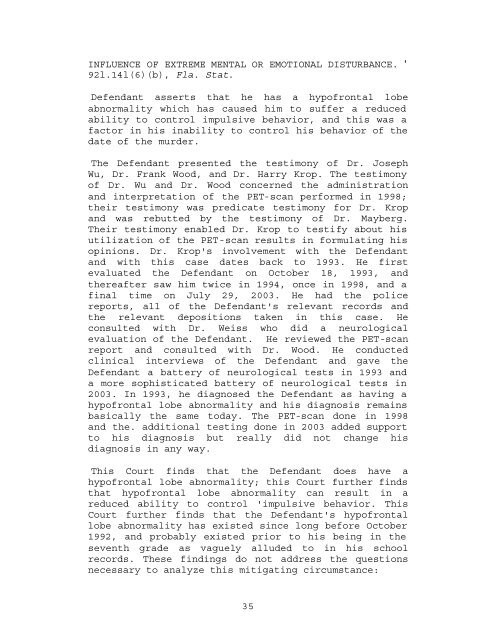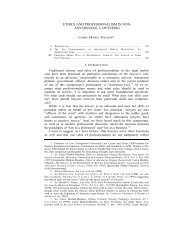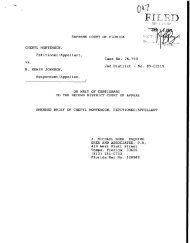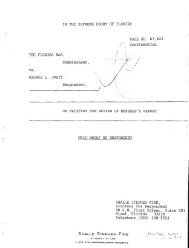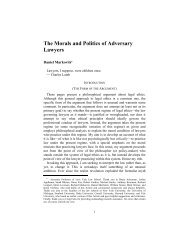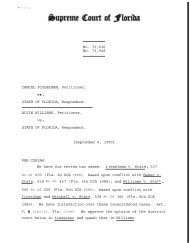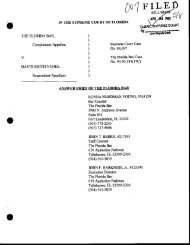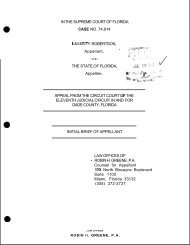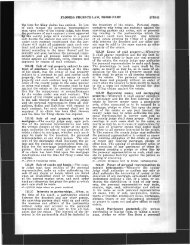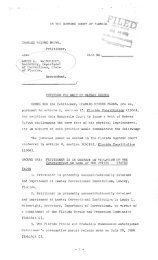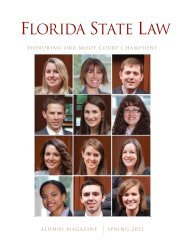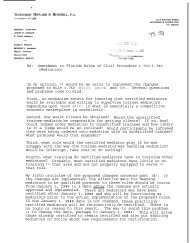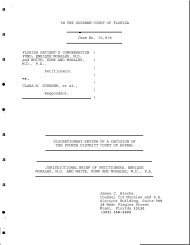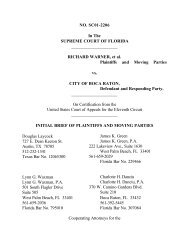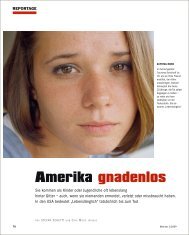Answer Brief of Appellee - Florida State University College of Law
Answer Brief of Appellee - Florida State University College of Law
Answer Brief of Appellee - Florida State University College of Law
Create successful ePaper yourself
Turn your PDF publications into a flip-book with our unique Google optimized e-Paper software.
INFLUENCE OF EXTREME MENTAL OR EMOTIONAL DISTURBANCE. '<br />
92l.14l(6)(b), Fla. Stat.<br />
Defendant asserts that he has a hyp<strong>of</strong>rontal lobe<br />
abnormality which has caused him to suffer a reduced<br />
ability to control impulsive behavior, and this was a<br />
factor in his inability to control his behavior <strong>of</strong> the<br />
date <strong>of</strong> the murder.<br />
The Defendant presented the testimony <strong>of</strong> Dr. Joseph<br />
Wu, Dr. Frank Wood, and Dr. Harry Krop. The testimony<br />
<strong>of</strong> Dr. Wu and Dr. Wood concerned the administration<br />
and interpretation <strong>of</strong> the PET-scan performed in 1998;<br />
their testimony was predicate testimony for Dr. Krop<br />
and was rebutted by the testimony <strong>of</strong> Dr. Mayberg.<br />
Their testimony enabled Dr. Krop to testify about his<br />
utilization <strong>of</strong> the PET-scan results in formulating his<br />
opinions. Dr. Krop's involvement with the Defendant<br />
and with this case dates back to 1993. He first<br />
evaluated the Defendant on October 18, 1993, and<br />
thereafter saw him twice in 1994, once in 1998, and a<br />
final time on July 29, 2003. He had the police<br />
reports, all <strong>of</strong> the Defendant's relevant records and<br />
the relevant depositions taken in this case. He<br />
consulted with Dr. Weiss who did a neurological<br />
evaluation <strong>of</strong> the Defendant. He reviewed the PET-scan<br />
report and consulted with Dr. Wood. He conducted<br />
clinical interviews <strong>of</strong> the Defendant and gave the<br />
Defendant a battery <strong>of</strong> neurological tests in 1993 and<br />
a more sophisticated battery <strong>of</strong> neurological tests in<br />
2003. In 1993, he diagnosed the Defendant as having a<br />
hyp<strong>of</strong>rontal lobe abnormality and his diagnosis remains<br />
basically the same today. The PET-scan done in 1998<br />
and the. additional testing done in 2003 added support<br />
to his diagnosis but really did not change his<br />
diagnosis in any way.<br />
This Court finds that the Defendant does have a<br />
hyp<strong>of</strong>rontal lobe abnormality; this Court further finds<br />
that hyp<strong>of</strong>rontal lobe abnormality can result in a<br />
reduced ability to control 'impulsive behavior. This<br />
Court further finds that the Defendant's hyp<strong>of</strong>rontal<br />
lobe abnormality has existed since long before October<br />
1992, and probably existed prior to his being in the<br />
seventh grade as vaguely alluded to in his school<br />
records. These findings do not address the questions<br />
necessary to analyze this mitigating circumstance:<br />
35


